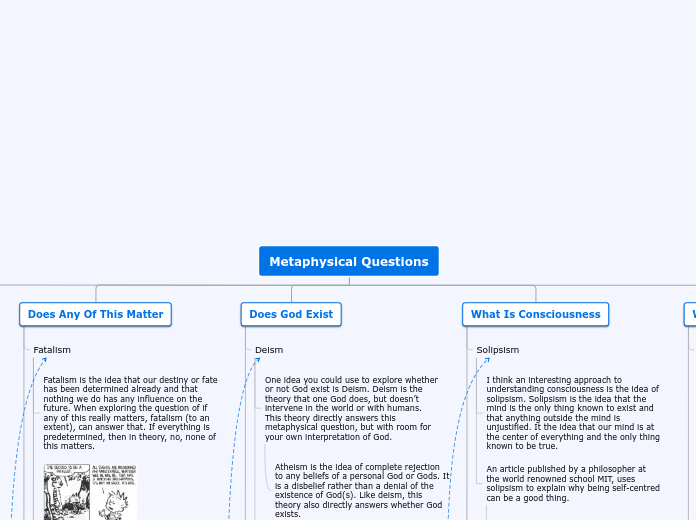Otto Neurath
Immanuel Kant
Rene Descartes
William James
Bertrand Russel
Voltaire
Aristotle
Friedrich Nietzche
Epicurus
William C. Bagley
Jean-Paul Sartre
Metaphysical Questions
What Is Free Will
Determinism
An article in the telegraph connects determinism and neuroscience, and uses determinism to provide a new angle on how much free will we actually have.
https://www.telegraph.co.uk/news/science/8058541/Neuroscience-free-will-and-determinism-Im-just-a-machine.html
Determinism, similar to fatalism, is the theory that every event, decision and action is determined by an unbroken chain of prior occurrences. Although this doesn’t mean that humans have no influence on the future, determinism offers the explanation that there is no such thing as free will.
I think you can use existentialism to help answer this question. Again, existentialism emphasizes an individual's free will and choice. It essentially states that we have no purpose until we make one for ourselves which is the epitome of freedom and free will.
I think fatalism can also be applied to the exploration of whether or not we have free will. As I previously mentioned, fatalism is the the concept that nothing we do will affect the future as everything is predetermined. I think from a fatalist point of view, we really don’t have free will. If everything is predetermined and nothing we do can change that, then we basically don’t have the authority to change or determine our own future, so we don’t have free will. Yes we would have free will from the things we do on a day to day basis, but if none of it changes it anything, then do we really have free will? Fatalism in an interesting pathway to explore this question, and has the capability to help answer it.
What Is Consciousness
Physicalism
There is a book called Free Will and Modern Science which outlines and uses physicalism in determination, predictability of our actions and the possibilty of free action.
http://britishacademy.universitypressscholarship.com/view/10.5871/bacad/9780197264898.001.0001/upso-9780197264898-chapter-4
Physicalism is the idea that everything exists no more than it’s physical properties. With this, it argues that the mind is a purely physical construct. When contemplating the idea of consciousness, physicalism could propose an interesting approach in the the mind, and ultimately consciousness, is merely physical.
Idealism
The University of Cambridge used the idea of idealism in basically everything, proposing that idealism has shaped the modern world in politics, science, art, etc.
https://www.cam.ac.uk/research/news/the-impact-of-idealism
Idealism is an idea centralized around consciousness being the only knowable thing, similar to solipsism. Idealism is that thoughts and ideas make up our reality, and that we can never be sure if anything in the outside world exists. I think this pathway could definitely help understand what consciousness is.
Solipsism
An article published by a philosopher at the world renowned school MIT, uses solipsism to explain why being self-centred can be a good thing.
http://news.mit.edu/2009/solipsism
I think an interesting approach to understanding consciousness is the idea of solipsism. Solipsism is the idea that the mind is the only thing known to exist and that anything outside the mind is unjustified. It the idea that our mind is at the center of everything and the only thing known to be true.
Does God Exist
Polytheism
In Los Angeles Review of Books, the idea of polytheism was used to help explain and review a book.
https://lareviewofbooks.org/article/left-in-polytheism/#!
Polytheism is the belief in multiple Gods with their own purpose. They all are distinct and separate beings, and seen as similar to humans but with additional powers, abilities, knowledge, etc. Again, polytheism directly answers whether God exists, and in this theory, multiple Gods exist.
Atheism
Recently, atheism has been used to explain the secularism in the government and media.
http://www.oxfordhandbooks.com/view/10.1093/oxfordhb/9780199935420.001.0001/oxfordhb-9780199935420-e-15
Deism
A study in the Wall Street Journal showed that deism is a rapidly growing belief.
https://www.wsj.com/articles/SB125365145301031757
One idea you could use to explore whether or not God exist is Deism. Deism is the theory that one God does, but doesn’t intervene in the world or with humans. This theory directly answers this metaphysical question, but with room for your own interpretation of God.
Atheism is the idea of complete rejection to any beliefs of a personal God or Gods. It is a disbelief rather than a denial of the existence of God(s). Like deism, this theory also directly answers whether God exists.
Does Any Of This Matter
Indeterminism
Recently, the philosophical theory of indeterminism has been used in the science of charged black holes. Up until now black holes have been deterministic. The articles says "The “Reissner-Nordström” solution of general relativity describes a black hole created when a star that is electrically charged and spherical collapses in on itself under the force of gravity. Hidden from view inside such a black hole’s event horizon lies a second boundary known as the Cauchy horizon, beyond which space-time is smooth but indeterminate. In other words, the future can no longer be predicted.".
https://physicsworld.com/a/does-general-relativity-violate-determinism-inside-charged-black-holes/
Indeterminism is basically the opposite of fatalism in the sense that nothing is determined and that we control the outcome of every day and overall our future. It can give a certain purpose to people knowing that we can control the things that we want, and propose an interesting approach to whether or not any of this matters. It poses the question that if we have responsibility for we everything we do, does that purpose make what we do matter, even if in the end no matter what we do, we die?
Nihilism
An interesting article in the Huffpost compares nihilism to the 'disease of decadence'. It uses the nihilism in our culture for the downfall in our society.
https://www.huffingtonpost.com/entry/2016-a-new-age-of-decaden_b_10431520
Nihilism is the idea that human existence has no meaning, purpose or objective. It has a similar outlook to fatalism when questioning whether any of this really matters, as it states that nothing we do has being or purpose. When it comes down to it, with a nihilist perspective, nothing we do matters.
Fatalism
This photo depicts a funny side of fatalism. It uses the idea of someone deciding to live in a fatalistic way. It poses an interesting question too, because if he believes in fatalism, shouldn't he believe that the tiger tripping him was fate?
Fatalism is the idea that our destiny or fate has been determined already and that nothing we do has any influence on the future. When exploring the question of if any of this really matters, fatalism (to an extent), can answer that. If everything is predetermined, then in theory, no, none of this matters.
What Is The Meaning Of Life
Hedonism
An interesting place where hedonism is found, is the Christian Bible. There are multiple verses that talk about the concept of hedonism, but in negative ways to support the idea that Christianity and the devotion to God is a very anti-hedonistic lifestyle. One example includes 2 Timothy 3:4, "treacherous, reckless, conceited, lovers of pleasure rather than lovers of God".
https://bible.knowing-jesus.com/topics/Hedonism
Hedonism is the idea that our primary goal in life is the pursuit of pleasure and happiness. When answering the question of the meaning of life using hedonism, one could say the meaning of life is pleasure and happiness. This could dictate how someone lives their life as they can follow this philosophical theory and live for happiness.
Essentialism
This meme shows the concept of essentialism. It jokes about how instead of the person choosing to do engineering, engineering chose them, like how in essentialism you don't chose your purpose, you are born with that role to fill.
Opposite to existentialism, essentialism is the idea that every entity, including humans, has a set of characteristics that are necessary to its identity and function. Essentialism is basically that we have a predetermined purpose to fill, although it might be up to us to find what the purpose is, hence finding the meaning to life. In this sense, someone could explore essentialism to find this meaning, as the meaning of life could be to make sure you fill the required attributes of being human.
Existentialism
One real world example of existentialism in the media is in UK Politics. In an article by the Independent concerning the Brexit and racism, they came up with something they call 'brexistentialism'. It uses the concept of existentialism to help justify the UK leaving the EU.
https://www.independent.co.uk/news/uk/politics/racist-no-i-m-a-brexistentialist-7130576.html
By definition, existentialism is the idea that humans exist first and then each individual spends their life finding or creating their own purpose. It is finding the meaning of life through free will, choice and personal responsibility. Existentialism is one pathway someone could explore to find the meaning of life. It a very open and personal pathway as it will be different for every person and they will have to decide for themselves what their meaning is.









